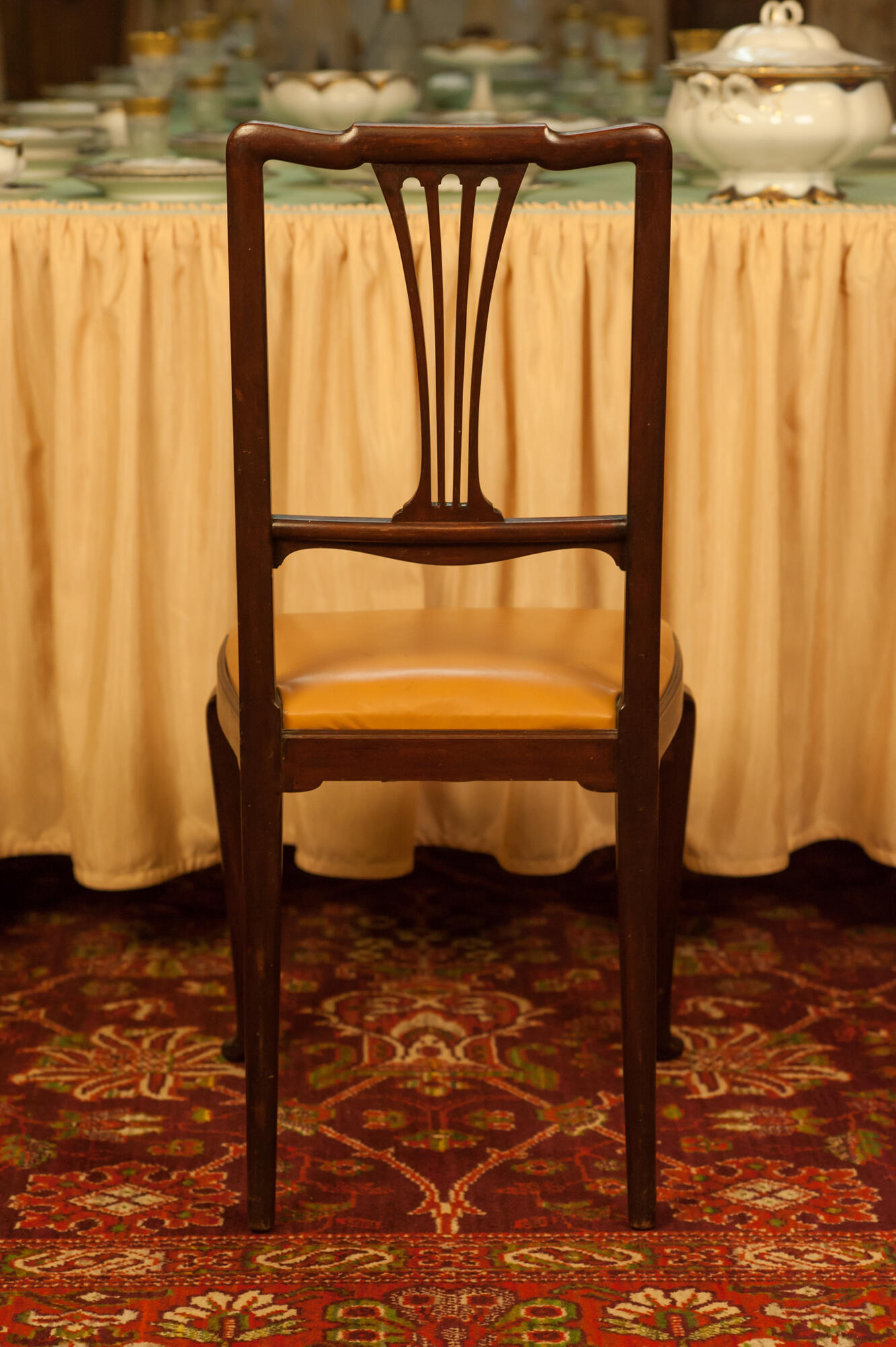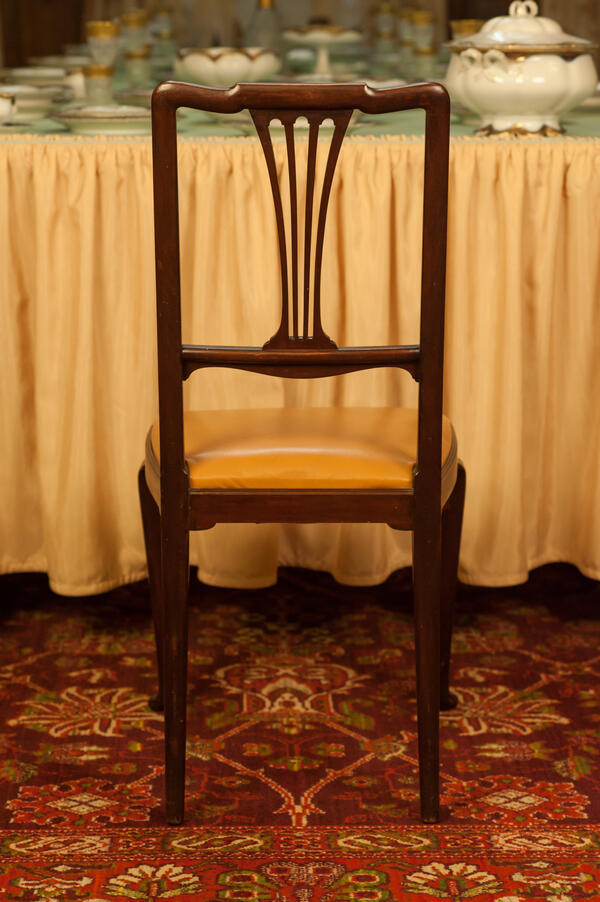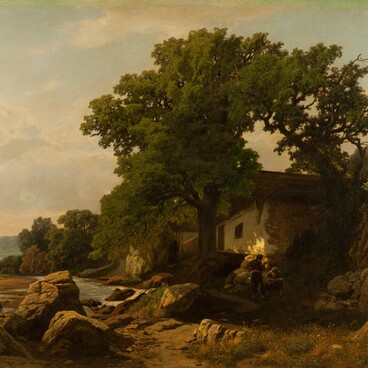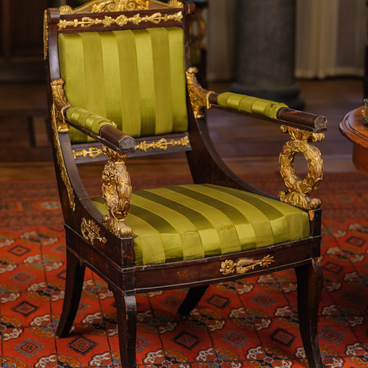A set of ten dining chairs arrived to the museum’s Dining Room in 1956. They are stable enough for their age and in adequately preserved.
The chair has a medium-soft seat cushion, an open rectangular backrest and its frame is made of polished mahogany. Its seat is covered in gold-colored leather. The crest rail is shaped like a wave with its corners rounded. The fancy pierced splat narrows downwards. The frame is straight and smooth, while the sides are rounded. Front legs end with cabriole feet. Back legs and the back frame are made of a single piece of wood and are slightly bent back. The reverse side of the seat cushion bears a stamp put directly on the leather lining, which reads: “F. Tarasov”s Furniture Factory 12th Squadron, 26. S.-Petersburg”. The stamp allows for attributing the chair as a work of Tarasov’s factory.
Fedor Tarasov had opened a small wallpaper workshop in a five-story building in Saint Petersburg at the very end of the 19th century. By the 1910s the workshop became one of the largest cabinet-making companies of the capital. The factory was situated on the Catherine Canal (now Griboyedov Canal), 92/1; the office – on Morskaya street, 28; the shop – on Mosrkaya street, 15. Tarasov was importing tools from Germany, fittings and textiles from France, and was subscribed to photo albums and latest project magazines. In contemporary documents he was listed as a ‘carpentry, cabinetry and wallpaper manufacturer’.
Russian furniture production before the 1917 Revolution was defined by simple yet elegant shapes, streamlined forms, and moderate decoration. Structural elements were the key elements of its design.
Tarasov’s factory was an official supplier of the Court of His Imperial Majesty. Its advertisement stated that it produced “furniture of great artistic value and interior decoration by the latest fashion and design projects”.
After the 1917 Revolution the factory was nationalized. More than once it changed names, production types, was closed and re-opened. In the 21st century the “Ladoga” furniture factory has little to do with its founder, Fedor Tarasov, an official an official supplier of the Court of His Imperial Majesty.
The chair has a medium-soft seat cushion, an open rectangular backrest and its frame is made of polished mahogany. Its seat is covered in gold-colored leather. The crest rail is shaped like a wave with its corners rounded. The fancy pierced splat narrows downwards. The frame is straight and smooth, while the sides are rounded. Front legs end with cabriole feet. Back legs and the back frame are made of a single piece of wood and are slightly bent back. The reverse side of the seat cushion bears a stamp put directly on the leather lining, which reads: “F. Tarasov”s Furniture Factory 12th Squadron, 26. S.-Petersburg”. The stamp allows for attributing the chair as a work of Tarasov’s factory.
Fedor Tarasov had opened a small wallpaper workshop in a five-story building in Saint Petersburg at the very end of the 19th century. By the 1910s the workshop became one of the largest cabinet-making companies of the capital. The factory was situated on the Catherine Canal (now Griboyedov Canal), 92/1; the office – on Morskaya street, 28; the shop – on Mosrkaya street, 15. Tarasov was importing tools from Germany, fittings and textiles from France, and was subscribed to photo albums and latest project magazines. In contemporary documents he was listed as a ‘carpentry, cabinetry and wallpaper manufacturer’.
Russian furniture production before the 1917 Revolution was defined by simple yet elegant shapes, streamlined forms, and moderate decoration. Structural elements were the key elements of its design.
Tarasov’s factory was an official supplier of the Court of His Imperial Majesty. Its advertisement stated that it produced “furniture of great artistic value and interior decoration by the latest fashion and design projects”.
After the 1917 Revolution the factory was nationalized. More than once it changed names, production types, was closed and re-opened. In the 21st century the “Ladoga” furniture factory has little to do with its founder, Fedor Tarasov, an official an official supplier of the Court of His Imperial Majesty.



